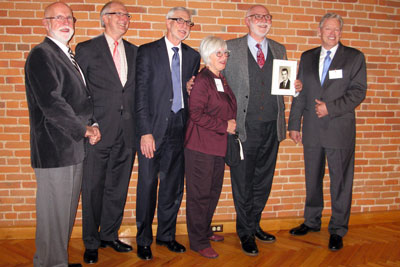DesJardins’ goal: ‘Teach Your Children’
January 7, 2015
By Mike Killeen

Joe DesJardins poses for a photo with Ralph Gross' siblings. From left: Michael Gross, Tom Gross, Roger Gross, Lois Rogers, Steve Gross, Joe DesJardins.
"Teach Your Children" by Crosby, Stills, Nash and Young peaked at No. 16 in the Billboard Hot 100 in 1970.
The song helps explain why Joe DesJardins became a philosophy major and ultimately a teacher.
"Why would anybody want to study ethics, unless you wanted to make the world a better place?" DesJardins said. "Without being too corny, 'Teach Your Children.' That's my generation. That song told us that the world is made better, not through revolution or war, but through teaching and education. That's what I believe."
After a nearly 10-year run as academic dean, associate provost and vice provost, DesJardins is returning to his roots teaching students as the Ralph Gross Chair in Business and the Liberal Arts at the College of Saint Benedict and Saint John's University.
The chair was established through a generous gift of the Gross estate. Ralph Gross graduated from SJU in 1965 with a bachelor's degree in economics. He went on to pursue advanced studies in business and accounting at the University of Minnesota and later became a certified public accountant.
DesJardins, who'll teach two classes each semester (although he is leading a study abroad trip to London spring semester 2015), sees the chair as a bridge principally between global business leadership and other academic areas.
Bringing philosophers in to teach ethics to business students has been used successfully by chairs at other institutions, including the Opus College of Business at the University of St. Thomas in St. Paul and the University of Minnesota's Carlson School of Management.
"It's very common for philosophers who deal with ethics to be located in the business department. It's a good fit, a common standard professionally," DesJardins said. "A lot of philosophers fill this role in business schools. Our difference is that rather than having one lone voice for humanities in a narrow business school curriculum, our business students are fully integrated in a broader liberal arts curriculum. At CSB and SJU, faculty and students address questions of ethics and values in most courses.
"The standard assumption is that I'm going to bring the liberal arts to the business curriculum," DesJardins said. "I want to do that in particular by bringing the courses I teach — business ethics, sustainability in ethics — to business students.
"I also want to be a voice for business in other disciplines. Our graduates who have gone on to successful careers in business have come not only from the management, accounting or economics departments, but also from philosophy, mathematics and political science. So, it's just natural that I should be working not only with global business leadership and accounting, finance and economics, but also the McCarthy Center and environmental studies," DesJardins said. "If I could wave my magic wand, every global business leadership or accounting student would minor in something like environmental studies or one of the languages."
DesJardins was a first-generation college student attending Southern Connecticut State College when he decided to study philosophy.
"I was actively involved in the anti-war movement (in Vietnam)," DesJardins said. "It was the spring of 1970, and I remember writing a flyer with a group of students that we were going to protest.
"I walk into my philosophy class, and we had been doing a section on logic, and the philosophy prof used that flyer as an example of illogical rhetoric. Not knowing that I helped write it, he just destroyed it," DesJardins said. "He walked us through a logical analysis of that flyer and showed all the fallacies. I sat there realizing, 'Wow, he's right.' What a powerful tool philosophy is. I realized that logic and reason, rather than mere passion, offered a better path to peace and justice.
"That was what made me want to study ethics. From Socrates on, philosophers have been engaged in the life of their society, doing their part to make it a better place. Socrates saw that for democracy to work, decisions needed to be made by educated citizens on the basis of reason, not passion. So, for me, ethics wasn't some abstract, esoteric silo. To do ethics was to be involved in life, trying to make it better, confronting politicians, confronting those in power and demanding that decisions be based on reason rather than power. This is the responsibility of every citizen in a democracy, and preparing students for their lives as citizens is one of the major responsibilities of a liberal arts education."
And that's what "Teach Your Children" is all about.
